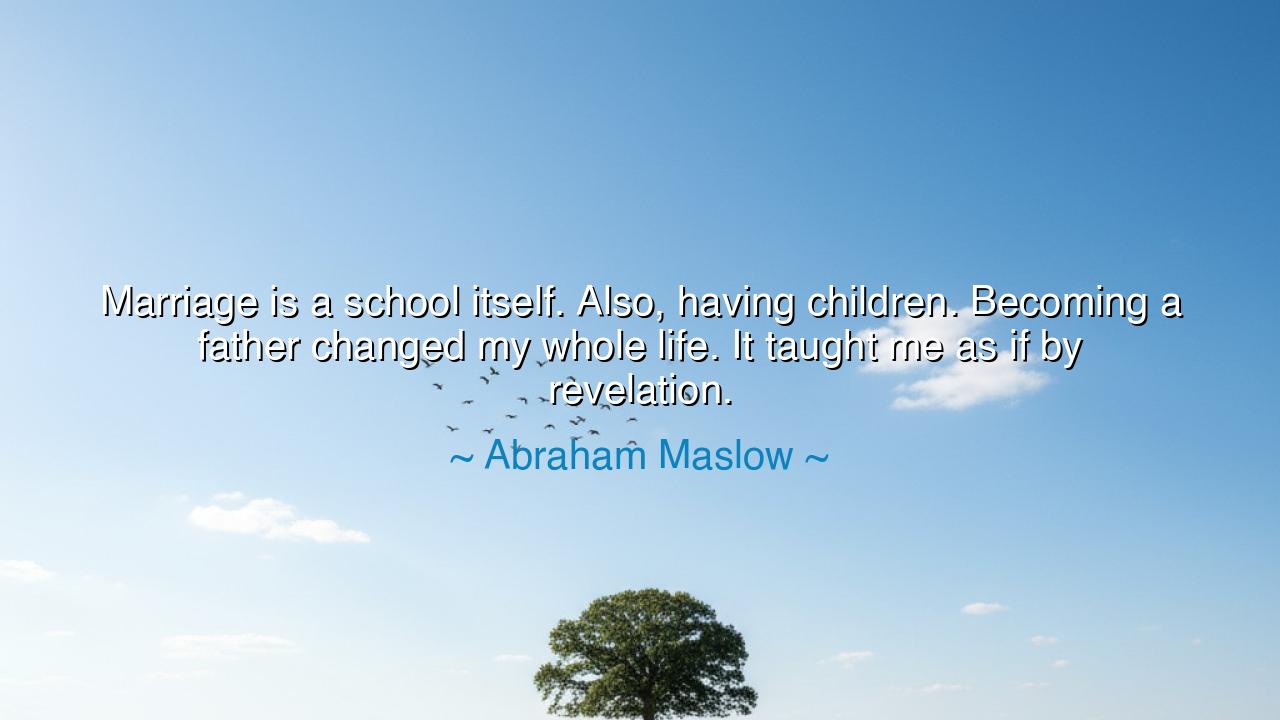
Marriage is a school itself. Also, having children. Becoming a
Marriage is a school itself. Also, having children. Becoming a father changed my whole life. It taught me as if by revelation.






The words of Abraham Maslow, “Marriage is a school itself. Also, having children. Becoming a father changed my whole life. It taught me as if by revelation,” come from a man who spent his life studying the human spirit and the ascent of the soul toward fulfillment. Yet here, the great psychologist — the architect of self-actualization — confesses that no classroom, no theory, no experiment could teach him what love, commitment, and parenthood revealed. His statement is not merely personal; it is universal. He reminds us that some of life’s deepest truths are not learned through intellect but through experience, not in solitude but in relationship.
To call marriage a school is to acknowledge that it is both a sanctuary and a crucible — a place of joy and a place of trial. Within it, two individuals learn the hardest of lessons: patience, forgiveness, humility, and unconditional giving. For all the world’s philosophies speak of virtue, but it is only in living closely with another soul that we are tested in its practice. Maslow, who sought to understand human potential, realized that the daily act of loving another person — of listening, compromising, and persevering — was a spiritual discipline as profound as any meditation or prayer. Marriage, then, becomes not the reward for maturity but the means through which maturity is achieved.
He extends this insight further when he speaks of having children, describing it as a revelation. To become a father or mother is to step into the sacred role of creator — to nurture life, to guide it, and to protect it. It strips away self-centeredness and replaces it with awe. Maslow saw this transformation in himself; it was as if a veil had been lifted, revealing new dimensions of empathy and purpose. Parenthood, like marriage, is not for the faint of heart. It demands sacrifice, and yet through that sacrifice, it opens the heart to a love that transcends understanding. To care for a child is to touch the eternal — to glimpse the future one will never see, carried forward in another’s breath.
In the ancient world, the sages also saw family as the foundation of wisdom. Confucius taught that harmony in the home was the root of harmony in the state. The Greeks held that the household — the oikos — was the seed from which civilization grew. They understood, as Maslow later would, that the lessons of patience, duty, and compassion learned within the family are the very skills that build just societies. For a man who cannot live in peace with his spouse or raise his children with tenderness cannot rule fairly, teach wisely, or serve faithfully. Thus, the family becomes humanity’s first and greatest teacher.
Maslow’s phrase, “It taught me as if by revelation,” suggests that these experiences do not merely inform — they transform. He speaks as one who was humbled by the mystery of love’s power. The lessons of marriage and fatherhood came not through reason but through awakening. They revealed truths about human nature that no textbook could contain: that growth is born from giving, that strength arises from vulnerability, and that the highest form of self-actualization is not achieved in isolation but in communion with others. His revelation was that to become whole, one must first learn to serve and nurture.
There is a quiet heroism in this understanding. The modern world glorifies independence and achievement, but Maslow reminds us that true greatness begins in devotion. To love one person faithfully, to raise a child with patience, to build a home filled with trust — these are acts of courage equal to any conquest or invention. For they require the daily overcoming of selfishness, the tempering of pride, and the steady exercise of compassion. The ancients would have called this the path of virtue, where the soul is refined through service and made luminous through love.
Let this be the teaching passed down to those who seek wisdom: do not flee from the ordinary, for within it lies revelation. Marriage will test your spirit; let it. Parenthood will humble your pride; embrace it. In loving and being loved, you will come to know yourself as you truly are — flawed yet capable of infinite tenderness. Do not fear the lessons that come from relationship, for they are the highest form of education life can offer. In the end, as Maslow discovered, the greatest teacher is not found in the mind but in the heart awakened by love.
Thus, Abraham Maslow’s words echo the eternal truth: that love is the true school of the soul. Through marriage and through children, we are taught what no philosophy can fully capture — that the purpose of life is not only to ascend, but to belong; not only to grow, but to give. And when one learns this lesson “as if by revelation,” he stands at last among the wise — not because he has conquered the world, but because he has learned to cherish it.






AAdministratorAdministrator
Welcome, honored guests. Please leave a comment, we will respond soon